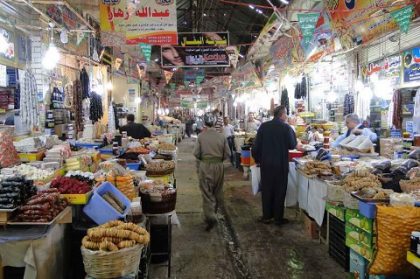Following the Turkish invasion on Syrian Kurdistan, there has been a boycott of Turkish goods in Iraqi Kurdistan. Now, if our craftsmen, especially in industries such as the plastics industry, can gain a foothold in the Kurdish market that has been more in the hands of the Turkish tradesmen, they can privilege from the situation. This is an analysis based on a report by an Arabic news agency.
The PIMI interpretation:
Following the Turkish military’s raid on areas controlled by the YPG’s Syrian Kurdish Forces, which, along with a number of Arab tribes, form the democratic Syrian SDF, a boycott of the Kurdish goods has begun in the Kurdish Autonomous Region. With more than billions of Rials of exports of the Iranian plastics products and artifacts to Iraq and taking the fact into account that our biggest competitors in Iraq and the Kurdistan region of Iraq, is the country and the Turkish companies, so this situation could be a great opportunity for Iranian industries to fill the gap created by the public ban of the Turkish products by the Kurdish people.
This meas that, the boycott of Turkish goods following the Syrian invasion will provide an opportunity for Iranian industries to expand their influence in the growing Kurdish market at this exceptional political climate. Certainly this opportunity is short and historical and should be expedited to take its advantage.
At the current situation, Turkey has high political influence in Iraqi Kurdistan, which is able to lift the sanctions immediately after the attacks on Syrian Kurds will terminate. As a result, this geopolitical opportunity should be optimized as far as possible. In particular, most of these sanctions relate to the area of the plastics packaging and packaged goods.
Unfortunately, in recent years, for a variety of reasons, such as price or product quality, we have not been able to afford to compete with the Turkish goods in Iraq, but now that Iraqi Kurds have decided to boycott Turkish products entirely, our craftsmen can safely take control of the region’s market and maintain the market even when sanctions are lifted, by improving quality and reducing profit.
Referring to the “Arab News” website, we can read: (source)
“Shopkeepers in Iraq’s Kurdish region have been responding to activists’ calls to boycott Turkish goods in protest at Ankara’s assault on Kurdish forces in neighboring Syria.
From pomegranates to plastic buckets, yoghurt and beauty products, Iraq imports more than $8 billion worth of Turkish goods a year through its autonomous Kurdish north.
But activists have set their sights on those imports in response to Turkey’s controversial two-week offensive against the Kurdish-run administration in northern Syria.
The assault has left dozens dead and displaced hundreds of thousands, including more than 12,000 who fled into the neighboring Kurdish-run part of northern Iraq.
“We can’t reach the front lines to fight the Turkish government with arms, so our weapon is a boycott of Turkish goods,” said Hamid Banyee, an Iraqi Kurdish singer and one of the boycott organizers.
“We’re looking to expand the campaign to include all parts of society, which will be a fatal blow to the Turkish economy,” he told AFP in Sulaimaniyah.
Activists in the northeastern city have distributed flyers in markets encouraging consumers to pass on Turkish products and are lobbying retailers to halt those imports altogether.
They have even explored a possible ban on Turkish movies and songs in the region.
Zana Ahmad, 28, gestured to well-stocked shelves of facial creams, gels and eyeliners in his shop, including Turkish, American and European brands.
“After the Turkish attack on Syria’s Kurds, we decided to stop importing Turkish goods and are trying to find alternatives,” he said.
The Kurdish-led Syrian Democratic Forces, which hold the territory attacked by Turkey, have backed boycotts.
“Each penny you spend on the Turkish goods, products and tourism turns into a bullet or into bombs that kill our children in northeastern Syria,” SDF spokesman Mustefa Bali said.
The Kurdish region spans most of Iraq’s north, including a 350 kilometer (220 mile) border with Turkey to the north and around 500 kilometers (310 miles) with Iran to the east.
Those two neighbors are Iraq’s top trade partners and their products mostly outpace locally produced goods in the market.
Karwan Jamal, a 45-year-old driver living in Sulaimaniyah, said he was now opting for Iranian goods even if they were more expensive.
“I’ve just bought a bottle of Iranian cooking oil, which costs 10,500 Iraqi dinars ($8) compared to 6,000 for a Turkish bottle,” he told AFP.
Jamal said swapping out foodstuffs was easy, but clothing was more complicated.
“Unfortunately, the Iranian-made clothes in the market are not as beautiful nor as widely available as Turkish ones,” he said.
Nasireddin Mahmud, who owns a dairy and biscuit retail company, said the boycott had meant that “demand for Turkish products has gone down by half.”
“Shop owners are refusing to buy Turkish goods and are asking for Iranian products or trying to swap them with local products,” Mahmud told AFP.
He said he wanted to see the boycott become official policy, so that large Turkish firms lose their right to import.
Sirwan Mohammad, who heads Sulaimaniyah’s chamber of commerce, said business owners were streaming into his office to ask how they may be affected.
“I believe continuing this campaign will hurt Turkish companies, as well as local businesses that bring those goods into the region,” he said.
Decreasing the amount of Turkish products in the markets “will not affect citizens because there are still goods from the Gulf, Iran and Europe — plus from the region and the rest of Iraq,” added Mohammad.
The autonomous region is split on Turkey, with the Patriotic Union of Kurdistan (PUK) and its stronghold of Sulaimaniyah opposing Ankara.”












